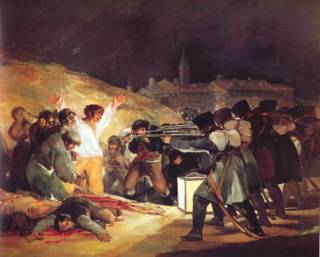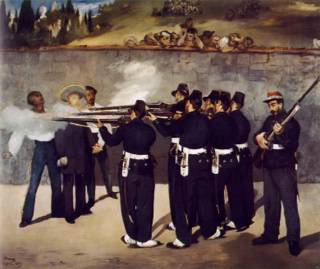George W. Bush speaking to the Republican National Convention in 2000,
As commander in chief, I will rebuild America's military and strengthen our alliances.I don't know about "rebuilding the military" but he's definitely 0/1 on the alliances.
logic is better than sex
George W. Bush speaking to the Republican National Convention in 2000,
As commander in chief, I will rebuild America's military and strengthen our alliances.I don't know about "rebuilding the military" but he's definitely 0/1 on the alliances.
George W. Bush, accepting the nomination for president at the 2000 Republican National Convention:
A generation shaped by Vietnam must remember the lessons of Vietnam: When America uses force in the world, the cause must be just, the goal must be clear, and the victory must be overwhelming.You said it, mate.
David Brooks disliked Kerry's acceptance speech:
When you actually read for content, you see that the speech skirts almost every tough issue and comes out on both sides of every major concern...For every gesture in the direction of greater defense spending, there are opposing hints about reducing our commitments and bringing the troops home.Oh, wait a second: didn't George W. Bush run on a platform of greater defense spending and reducing our overseas commitments in 2000?
I wish Slate's Kerryism of the Day would deconstruct this passage from the acceptance speech:
I know that there are those who criticize me for seeing complexities, and I do, because some issues just aren't all that simple. Saying there are weapons of mass destruction in Iraq doesn't make it so. Saying we can fight a war on the cheap doesn't make it so. And proclaiming mission accomplished certainly doesn't make it so.
On the moral world of the Volokh Conspiracy: what are the most important events of the last year or so?
Two weeks ago The New Republic reported that the Bush administration was putting pressure on Pakistan to provide high-profile terrorist captures in time before the election. One specific source said the administration asked Pakistan to announce a capture this week to steal media coverage from the Democratic National Convention:
Lieutenant General Ehsan ul-Haq, informed tnr that the Pakistanis "have been told at every level that apprehension or killing of [High Value Targets] before [the] election is [an] absolute must." What's more, this source claims that Bush administration officials have told their Pakistani counterparts they have a date in mind for announcing this achievement: "The last ten days of July deadline has been given repeatedly by visitors to Islamabad and during [ul-Haq's] meetings in Washington." Says McCormack: "I'm aware of no such comment." But according to this ISI official, a White House aide told ul-Haq last spring that "it would be best if the arrest or killing of [any] [terrorist High Value Targets] were announced on twenty-six, twenty-seven, or twenty-eight July"--the first three days of the Democratic National Convention in Boston.
Reaction to the Kerry speech: loved it. About as compelling a defense of modern liberalism as I've seen an American politician make recently. By using the rhetoric of values to argue the case for ethical foreign policy, health care, and help for the homeless Kerry simultaneously cut the ground under Bush and crafted a naturally appealing argument for (not-so-popular) liberal policies:
For four years, we've heard a lot of talk about values. But values spoken without actions taken are just slogans. Values are not just words. They're what we live by. They're about the causes we champion and the people we fight for. And it is time for those who talk about family values to start valuing families.
You don't value families by kicking kids out of after school programs and taking cops off our streets, so that Enron can get another tax break.
We believe in the family value of caring for our children and protecting the neighborhoods where they walk and play.
And that is the choice in this election.
You don't value families by denying real prescription drug coverage to seniors, so big drug companies can get another windfall.
We believe in the family value expressed in one of the oldest Commandments: "Honor thy father and thy mother." As President, I will not privatize Social Security. I will not cut benefits. And together, we will make sure that senior citizens never have to cut their pills in half because they can't afford life-saving medicine.
And that is the choice in this election.
You don't value families if you force them to take up a collection to buy body armor for a son or daughter in the service, if you deny veterans health care, or if you tell middle class families to wait for a tax cut, so that the wealthiest among us can get even more.
I don't wear my own faith on my sleeve. But faith has given me values and hope to live by, from Vietnam to this day, from Sunday to Sunday. I don't want to claim that God is on our side. As Abraham Lincoln told us, I want to pray humbly that we are on God's side.

...when the original civil rights marches were being organized, those behind them INSISTED that anyone participating must look and act a certain way. Folks had to be clean, they had to have good haircuts and either be shaved or with neatly-trimmed beards and mustaches. On many of the early civil rights marches, men HAD to wear ties and white shirts and dress slacks. Women HAD to wear neat, professional work dresses or skirts and blouses.
Today, there are plenty of (mostly leftists) who want to protest but almost never, it seems, actually think much about whether or not they are going to have an impact. Martin Luther King and other civil rights pioneers were deadly serious about what they were trying to accomplish. They weren't going out there just to feel good about themselves: they had a clear agenda, and didn't want anything to hurt their efforts. Most particularly, they did not want any "supporter" actually hurting their cause. For a stark contrast to this, consider that here in Portland, Oregon, there are regular anti-war protests downtown. Just about every week. The participants have a bunch of banners and signs, and they always have a drummer or two pounding away. They march along the sidewalks, stopping for lights, and I believe they always have permits. But they look like a band of hippies, and absolutely NO ONE takes them seriously. Even people opposed to the war sniff at them. I am quite sure that they have NEVER turned a single opinion against the war, and quite possibly managed to turn away more than a few middle-of-the-roaders...
...it seems to me that many leftists who engage in protests -- marches, demonstrations, and so on -- do so in order to look like they're doing something, or feel like they're doing something ... but not, in fact, in order to actually DO something.
Tyler Cowen remarks that if he is burried alive, he wants a copy of Spenser's The Faerie Queene in the coffin to read when he wakes up.
In the time-honored tradition of bloggers criticizing the conventional media: I turned on CNN yesterday for pre-convention coverage - first time I watched cable news in a few months - to see Lou Dobbs ask a political journalist "How important is this night of the convention for John Kerry?" If you're curious, the answer was "very important." Dobbs then asked a different journalist how important last night was.
Hockey commentary is always moronic, but it reaches a special intensity of moronitude at playoff time. You know what I'm talking about: the "this game is critical" analysis, sometimes phrased as a question ("Pat, how critical is it to win this game?"). Fellas, can I let you in on a secret? In a seven-game series, every game is critical. Lose that first game, and you're down 0-1: you're behind the eight-ball right off the top. Then there's the critical second game: win it, and the series is all tied up, the momentum is all yours; lose, and you're facing a 2-0 deficit, and as we know, only 35 teams in 962 series have come back from 2-0 to win (gosh: you mean teams that lose games usually lose series?).
But now we come to the critical -- I mean critical -- third game. Maybe the teams are tied going in: so whoever wins gets the all-important edge. Or one team's up 2-0: they win, and they're up 3-0, and you might as well just go home; they lose, and suddenly they're vulnerable, the momentum has shifted etc. Oh, but that's just the prelude to the critical fourth game: the clincher, or maybe the last stand, or possibly the one that ties it all up, or sometimes the one that breaks a tight series wide open.
Of course, the fifth game, now the fifth game's critical...
I couldn't agree more: William Saletan writes on the DNC,
The 2004 Democratic National Convention begins inauspiciously. Delivering the invocation, Rev. Stephen Ayres of Boston's Old North Church warns the delegates that had it not been for the courage of Boston's American revolutionaries, "You might be gathered this week to nominate Tony Blair instead of John Kerry." Even with Blair's stock at an all-time low, the deal sounds tempting.
I can't read literary blogs.
- So why have you come to see Ivan Vasilevich?This is how I feel about literary blogs: must they write about new books? Are we running out of old books? The problem with recently published material is that I haven't read most of it and the most I can get out of a review is an item to add to my amazon.com wish list. Why not write about the "old" authors all of us are roughly familiar with?
- Leontiy Sergeevich, --interjected Ivan Vasilevich, -- has brought me a play.
- Whose play? --asked the old woman, looking at me with sorrowful eyes.
- Leontiy Sergeevich has composed a play himself!
- But why? --anxiously asked Nastasia Ivanova.
- What do you mean, why? ...Hmm...hmm....
- Have we no plays these days? --replied Nastasia Ivanova, gently and condescendingly. --How many wonderful plays exist! Begin to perform them all, one after another -- twenty years later you would not run out of plays! Why, then, create a new one?
She was so convincing that I was unable to fashion a response.
The proponents of prediction markets claim that that society would derive valuable information about the future by looking at the trading rates of these markets. But would this information be of any use in coordinating long term policy?
One time when I was a kid I came across something about the Buffon needle problem - if you drop a needle randomly between two lines, the probability that it will cross one of the lines has a remarkably simple expression: [2*(length of the needle)]/[pi * distance between the lines]. This fact can be used to obtain an approximation for pi: just drop a lot of needles on a tiled floor, count how many intersect lines, and set the above expression equal to that; solve for pi. Without much ado, I went to the kitchen, emptied the contents of a few boxes of toothpics on the floor, crouched on my knees, and started counting.
Writing in the Guardian, John Galbraith makes the following bizzare claim:
At the end of the second world war, I was the director for overall effects of the United States strategic bombing survey - Usbus, as it was known. I led a large professional economic staff in assessment of the industrial and military effects of the bombing of Germany. The strategic bombing of German industry, transportation and cities, was gravely disappointing. Attacks on factories that made such seemingly crucial components as ball bearings, and even attacks on aircraft plants, were sadly useless. With plant and machinery relocation and more determined management, fighter aircraft production actually increased in early 1944 after major bombing. In the cities, the random cruelty and death inflicted from the sky had no appreciable effect on war production or the war.
These findings were vigorously resisted by the Allied armed services - especially, needless to say, the air command, even though they were the work of the most capable scholars and were supported by German industry officials and impeccable German statistics, as well as by the director of German arms production, Albert Speer.
I am one of those World War II veterans who are dying off at a rapid pace, and I can't stand the thought of dying under a Bush administration.From an 87 year old Kerry supporter, quoted by the Times in an article on the growing polarization of the electorate.
Innovation in campaigning:
Criticized early in the campaign for his failure to take any stand on the war in Iraq, [Colorado Senate candidate] Coors eventually declared that he agrees with his opponent on all major issues.
From an interview with Robert Shiller in March 2000 - Shiller is a bearish economist who at the time was predicting large stock market declines soon to come:
Q: What about all the productivity improvements brought about by the Net?
A: Is the actual invention of the Internet more important than vending machines? They're everywhere! Think of all the labor they save! That's a pretty good invention, but I don't hear anyone saying that the stock market should triple because of vending machines.
Via Marginal Revolution, I came across this paper which purports to explain why the United States does not have a European-type welfare state: the US is a lot more ethnically diverse and ethnically diverse countries tend to spend very little on welfare.









In 1967, the same year that Che died, the radical French activist Guy Debord wrote The Society of the Spectacle which, among other things, predicted our current obsession with celebrity and event. 'All that was once directly lived', wrote Debord, 'has become mere representation.' Nowhere is this dictum more starkly illustrated than in the case of Che, who, in the four decades since his death, has been used to sell everything from china mugs to denim jeans, herbal tea to canned beer. There was, maybe still is, a brand of soap powder bearing his name, along with the slogan 'Che washes whiter'. Today, Che lives! all right, but not in the way he or his fellow revolutionaries could ever have imagined in their worst nightmares. He has become a global brand.--from The Guardian.
Was the success of the terrorists on 9/11 primarily a failure of imagination, a result of our inability to envision that terrorists would hijack planes and crash them into buildings? Fred Kaplan, writing in Slate, argues that's not the case:
As early as 1995, Abdul Hakim Murad told Philippine authorities that he and Ramzi Yousef, who was arrested for his role in the 1993 bombing of the World Trade Center, had planned to fly an airplane into CIA headquarters. This wasn't dismissed as a crazy idea. The year before, a group of Algerians actually had hijacked a plane in France with the intention of crashing it into the Eiffel Tower.
In September 1998, a U.S. consulate in East Asia was warned about an impending al-Qaida plot to fly an explosives-laden airplane into an American city.
Around the same time, Richard Clarke, the White House counterterrorism chief, conducted an exercise in which terrorists commandeered a Learjet, loaded it with bombs, and flew it into a target in Washington, D.C. Clarke asked Pentagon officials what they could do to stop such a threat. They answered they could scramble jet fighters, but they would need authority from the president to shoot the plane down. The exercise went no further.
On Dec. 4, 1998, the President's Daily Brief by the CIA warned that "bin Laden and his allies are preparing for an attack in the US, including an aircraft hijacking" to compel the freeing of those responsible and imprisoned for the 1993 bombing of the World Trade Center.
The North American Aerospace Defense command also conducted an exercise to counter a terrorist attack involving smashing an airplane into a building (though the scenario assumed the plane would be coming from overseas).
Quite independently, in August 1999, the Federal Aviation Administration's intelligence branch warned of a possible "suicide hijacking operation" by Osama Bin Laden.
On May 1, 2001, the Federal Aviation Administration issued a circular to airliners, informing them of intelligence reports about a possible terrorist hijacking.
On June 22, 2001, the CIA notified its station chiefs about an al-Qaida plot to attack American cities with planes.
All of these scenario-spins (plus several others, similarly spelled out in various blue-ribbon commissions) preceded the infamous President's Daily Brief of Aug. 6, 2001, which warned George W. Bush, "Bin Laden Determined to Strike in US."
In defense of racial profiling: Daniel Drezner quotes an article from the Persian Mirror arguing against the racial profiling of airline passengers,
Even within the Arab community, should there not be a difference between a Saudi, an Egyptian, a Jordanian, a Kuwaiti, or an Iraqi? How do we profile them? Instead of trying to make the world a Mickey Mouse Park where things fit neatly into boxes and security agents can pick and choose terrorists with color-coded instructions from the government, shouldn't we put some real brains behind the plethora of terrorist networks that continue to terrorize our daily activities all over the world?
Recent events in Iraq reminded me of these paintings; I am not trying to draw historical parallels.




Terrorism is no big deal: each year about 41,000 Americans die in road accidents and aproximately 98,000 die from medical errors -- yet we never even pause to think about these deaths. There's no reason why we couldn't accept ~10,000 deaths per annum from terrorism as normal.
A New York Times article highlights the case of Karen Coveler who, after giving birth to a deaf child, found out a simple test could have told her there was a high risk of it happening:
...Dr. Ostrer said that almost no one offered [the deafness test], including the genetic counselors he supervises, because of opposition from advocates for the deaf who argued that deafness was not a disease.
'If people ask us, 'What about that deaf test I heard about?' we will tell them about it,'' Dr. Ostrer said, 'But we aren't more proactive about it because of the sensitivities of the deaf community.''"
Paul Krugman's latest column discusses how President Bush's actions have ended up bolstering terrorist movements throughout the world; its a good read, but it contains this eyebrow-raising aside:
At the same time, [he] would neglect the pursuit of those who attacked us, and do nothing about regimes that really shelter anti-American terrorists and really are building nuclear weapons.
Over at The Leiter Reports, Brian Leiter makes some highly questionable claims.
[Economics] is better, perhaps, than astrology, but not much more predictively successful than common-sense psychology. It parlays a set of implausible and utterly unrealistic assumptions into tidy, mathematically-expressible theories that have little or no connection to reality...
The New Yorker uses the example of Nobel laureate Robert Lucas's anti-Keynesian theories attacking the ability of the Federal Reserve to affect the economy, theories that exerted a profound affect on public policy for some time. "[A] number of [subsequent] empirical studies" (55) disconfirmed them…. [other examples omitted].
A New York Times report released today entitled "When a Campaign Intrudes on Vacation" begins,
President Bush has spent the last three Augusts at his ranch in the scorched flatlands of Crawford, Tex., where he has cleared brush, gone for runs in 105-degree heat and summoned sweaty cabinet members to eat fried jalapeño peppers at the only restaurant in town.
But this year, the 2004 campaign has ruined Mr. Bush's Texas vacation.
Final details are to come, but the bottom line is that Mr. Bush will spend only two weeks at the ranch compared with his usual four.
Writing on the 2000 election, Barbara Ehrenreich had this to say about voting for Gore:
We are being summoned to save this inveterate bribe-taker because "a vote for Nader is a vote for Bush." That in itself is a disturbingly Orwellian proposition...
Ralph, sit down. Pour yourself a Diet Pepsi and rejoice in the fact that - post-Enron and post-Iraq war - millions have absorbed your message. You're entitled to a little time out now, a few weeks on the beach catching up on back issues of The Congressional Record.
...a lot of sewage has passed under the bridge since 2000. Back then, Al Gore was campaigning with the furious energy of an old-growth oak. George W. Bush looked like a dumbed-down version of Gerald Ford a man who could be trusted to while away his presidency on the elliptical trainer.
You've been kissing up to the Reform Party, which ran paleo-right-winger Pat Buchanan the last time around. You've been caught dallying with the former New Alliance Party, described by Christopher Hitchens, with his customary restraint, as a "zombie cult."
About a year and a half ago, Marge Piercy wrote a poem called Choices. It began:
Would you rather have health insurance
you can actually afford, or occupy Iraq?
Would you rather have enough inspectors
to keep your kids from getting poisoned
by bad hamburgers, or occupy Iraq?
Would you rather breathe clean air
and drink water free from pesticides
and upriver shit, or occupy Iraq?
We're the family in debt whose kids
need shoes and to go to the dentist
but we spend our cash on crack
Reading Les Liaisons Dangereuses yesterday, I was struck by the techniques of seduction among the 18th century French. In the novel, Vicomte de Valmont wins over a woman who initially rejected him and told him not to bother her with protestations of his love -- by writing letters in the following vein,
You forbid me, Madame, to speak to you of my love; but where shall I find the courage requisite to obey you? Occupied solely by a sentiment which should be so soft and which you render so cruel; languishing in the exile to which you have condemned me; living only upon privations and regrets; a prey to torments, the more painful in that they continually remind me of your indifference; must I be compelled to lose the one consolation that is left me, and can I have any other than sometimes to open to you a soul which you fill with distress and bitterness? Will you avert your gaze in order not to see the tears which are shed owing to you? Will you refuse even the homage of the sacrifices you exact? Would it not be more worthy of you, more worthy of your virtuous and gentle soul, to pity a wretch who is only such because of you, than to wish to aggravate his sufferings still more by a prohibition which is both unjust and harsh?
Interesting: from an article in today's Times,
When deciding where to run his television advertisements, President Bush is much more partial than Senator John Kerry to crime shows like "Cops," "Law & Order" and "JAG." Mr. Kerry leans more to lighter fare, like "Judge Judy," "The Ellen DeGeneres Show" and "Late Show with David Letterman.
Crime shows appeal to the Bush campaign because of its interest in reaching out to Republican men who are attracted to such programming. By contrast, the Kerry campaign is more interested in concentrating on single women, who tend to be drawn to shows with softer themes.
I scanned this from Time magazine:

Today's Times reports:
The fast-growing movement to unionize graduate students at the nation's private universities suffered a crushing setback yesterday when the National Labor Relations Board reversed itself and ruled that students who worked as research and teaching assistants did not have the right to unionize.
In a case involving Brown University, the labor board ruled 3 to 2 that graduate teaching and research assistants were essentially students, not workers, and thus should not have the right to unionize to negotiate over wages, benefits and other conditions of employment.The Republican-controlled board reversed a four-year-old decision involving New York University, a private institution, in which the board, then controlled by Democrats, concluded that graduate teaching and research assistants should be able to unionize because their increased responsibilities had essentially turned them into workers.
1. This should prove, for the millionth time, that Republicans and Democrats are not indistinguishable and that it matters quite a bit who you vote for -- so don't throw your vote away by voting for Nader!
2. I'm with the Republicans on this one; unionization will lead to increased wages for graduate students and, by corollary, lower admission rates. It can be argued that many fields are currently overproducing PhDs, creating high rates of unemployment among advanced degree holders. But there are also many fields that are not overproducing PhDs and the unionization of graduate students may prevent the United States from getting all the engineers & scientists its economy may need in the future.
Ultimately, a PhD should be available to anyone who is competent and willing to sacrifice years of his life for it -- this would not be so under unionization.
The Federal Marriage Amendment vote has restored my confidence in our government: In mid-May, CBS News conducted a poll with the following question,
From Senator Rick Santorum:
Isn't that the ultimate homeland security? To defend the sanctity of marriage?
From Benjamin Netanyahu's op-ed in the Times about Israel's security fence, responding to critics who argue that the fense usurps Palestinian land:
...the indefensible line on which many have argued the fence should run — that which existed between Israel and the Arab lands before the 1967 war — is the only line that would have nothing to do with security and everything to do with politics. A line that is genuinely based on security would include as many Jews as possible and as few Palestinians as possible within the fence.
That is precisely what Israel's security fence does. By running into less than 12 percent of the West Bank, the fence will include about 80 percent of Jews and only 1 percent of Palestinians who live within the disputed territories.
I tried to read Richard Russo's Straight Man last night -- but couldn't get past the first 20 pages or so. I initially picked up the book in a bookstore and leafed through it -- it seemed to be a run of the mill academic satire, about a department head who threatens to execute a goose each day until he gets his budget from the Dean -- and finds out who must be laid off. The book's description of the protoganist's father made me chuckle -- "My parents were academic nomads...the academic position [my father] favored was the 'distinguished visiting professor' variety, usually created for him, duration of visit a year or two at most, perhaps because its hard to remain distinguished among people who know you."
And another thing about Fahrenheit 9/11: Moore makes much of a visit by a Taliban envoy to the state department in 2001. "Why on earth would the Bush administration allow a Taliban leader to visit the United States knowing that the Taliban were harboring the man who bombed the USS Cole and our African embassies?" Moore asks.
Slate's international papers sections summarizes the main articles and editorials in papers around the world. The latest edition notes,
In the aftermath of Sunday's Tel Aviv bombing that killed one Israeli, Oslo's Aftenposten noted that the security barrier cannot prevent all attacks. "This is not the first time in history that a land has tried to protect itself from enemies with a physical barrier. These attempts have not lived up to their expectations."
These guys are just plain evil: Republican congressmen have defeated an effort to curb the worst and most objectionable provision the Patriot act. The act gives the goverment the power to subpoena records of your transactions with third parties -- books you check out of the library, movies you rent from Blockbuster, Sandwiches you buy from subway -- without a warrant, without the consent of a judge. The amendment defeated on the House floor would have allowed these things only with a warrant.
Some more ramblings on Fahrenheit 9/11: most of the movie consisted of some rather cheap shots at the Iraq policy of the administration. These ranged from the tiring -- showing, at length, the grieving of a woman whose son died in the war -- to the morally repugnant -- showing pictures of happy Iraqis, boys flying kites, during Saddam Hussein's reign.
I saw Fahrenheit 9/11 today. I was initially torn about going -- I was curious to see the movie but I intensely dislike Michael Moore and did not want to support him by buying a ticket. In the end, I found the perfect solution: I bought a ticket to Dodgeball and snuck into Fahrenheit 9/11. Clearly, all those years as an engineering major did me a lot of good.
But if you are writing a book critical of a president who has a problem with the truth, it does not require all that much intelligence to figure out the importance of being truthful yourself. Moore could care less.
Todays Times carries an article describing recent efforts by conservative activitists and Republican members of Congress to stifle scientific research they don't like:
...professionals in sex-related fields who have started speaking out against what they say is growing interference from conservatives in and out of government with their work in research, education and disease prevention.
A result, these professionals say, has been reduced financing for some programs and an overall chilling effect on the field,with college professors avoiding certain topics in their human sexuality classes...
When Representative Patrick J. Toomey, Republican of Pennsylvania, wanted to stop the National Institutes of Health from spending $1.5 million on studies he said were wasteful and unnecessary, he pointed to what he described as research on the sexual habits of transgender American Indians and "people's reaction to being aroused when they're in different moods."
The spending had been vigorously opposed by the Traditional Values Coalition, a group that represents churches primarily. Andrea Lafferty, executive director of the coalition, said her group's intention was to challenge research grants that "don't pass the straight-face test." "There's an arrogance in the scientific community that they know better than the average American," Ms. Lafferty said.
What makes a useful education? Not math, according to some:
When, after the examinations at the end of the first term, she looked at the papers they had been set, she read some of the more vulnerable of the questions aloud with the greatest contempt: "A window cleaner carries a uniform 60-lb. ladder 15 ft. long, at one end of which a bucket of water weighing 40 lb. is hung. At what point must he support the ladder to carry it horizontally? Where is the c.g. of his load?" Miss Brodie looked at the paper, after reading out this question as if to indicate that she could not believe her eyes. Many a time she gave the girls to understand that the solution to such problems would be quite useless to Sybil Thorndike, Anna Pavlova and the late Helen of Troy.
Dear Prudence,
My wife and I are expecting our first child in October. She plans to continue working after we have our baby, and she is being bombarded by people who make her feel as if she's an unfit mother for wanting to work outside the home. For example, a lady at our church told her she would NEVER let anyone else raise her baby. Others just ask how she could possibly leave her baby with someone else. Many just she give her a condescending look. Most of these comments come from people she does not even know!
The following bit from The Crying of Lot 49 puzzled me until I learned that Pynchon was, at one point, an engineering student at Cornell:
At some indefinite passage in night's sonorous score, it also came to her that she would be safe, that something, perhaps only her linearly fading drunkenness, would protect her.
She knews, because she held him, that he suffered DT's. Behind the initials was a metaphor, a delirium tremens, a trembling unfurrowing of the mind's plowshare..."dt," God help this old tattooed man, meant also a time differential, a vanishingly small instant in which change had to be confronted at last for what it was, where it could no longer disguise itself as something innocuous like an average rate; where velocity dwelled in the projectile be frozen in midflight, where death dwelled...
Surprise -- attitudes on makeup have changed in the last 300 or so years -- but not so much: from Moll Flanders, written in 1722, a description of a rapidly aging woman in her late forties preparing for a meeting:
I dressed to all the advantage possible, I assure you, and for the first time used a little art; I say for the first time, for I had never yielded to the baseness of paint before, having always had vanity enough to believe I had no need of it.
A question: why does everyone in new england have a stick up their ass?
Journalists and economists have been fawning over China's economic growth lately. Yesterday's Times brings news that economic growth in China is so high that there is fear of an electricity shortage due to rapidly rising demand; Sunday's edition features a 10-part special I, for the life of me, could not get through, entitled The Chinese Century. A steady stream of articles on China's economic prowess has been coming from news sources over the past few years.
Am I liberal or conservative? Its certainly hard to tell from this weblog: I was looking through my recent entries when I observed an interesting juxtaposition -- I claimed that liberals were either hypocritical or obsessive and dumb in this post; two days afterward I wrote this, arguing that over-representation of stupid people among conservatives explains their relative scarcity in academia.
Is this a good idea? Today's Times runs an article on welfare policy in the United States which contains the following blurb about (unnamed) state-level officials:
[State] officials seek more freedom to tailor their programs to local needs. They want to expand the definition of work to include more vocational education and drug treatment...
From Machiavelli:
For my part I consider that it is better to be adventurous than cautious, because fortune is a woman, and if you wish to keep her under it is necessary
to beat and ill-use her.
This would be funny if it weren't sad.
Conservatives in the blogosphere have made much of the disparity in GDP per capita between US and Europe: measured at purchasing power parity, GDP per capita is 40% higher in the United States. See this Instapundit thread on whether Sweden is poorer than Mississippi to see how this fact is used in the blogsophere.
In February, Robert Brandon, the chair of the Duke Philosophy department, was asked why registered Republicans are under-represented at Duke.His response:
We try to hire the best, smartest people available," Brandon said of his philosophy hires. "If, as John Stuart Mill said, stupid people are generally conservative, then there are lots of conservatives we will never hire.
Interesting: Public Ownership in the American City by Edward Glaeser argues that corruption was one of the the main reasons why cities moved to government ownership of utilities and public transportation. In the late 19th and early 20th centuries, local governments often subcontracted the provision of water, street sweeping, transportation to private firms; but quite often the contracts went to firms owned by city bosses. It was also common for private firms to bribe officials to get the government to purchase/sell goods at an unreasonable price. Public opposition to this was one of the main reasons, Glaeser argues, why cities began to provide transportation/utilities services themselves.
Shorter Paul Krugman: Michael Moore's "Fahrenheit 911" fools you into thinking lots of things are true that actually, umm, arent true; but it criticizes Bush, whom I dislike, so its a good movie. By the way, not all of the facts in the movie are wrong. And if conservatives don't like Moore's deceptions, why don't they criticize Bush for lying?
More on the center in American politics: from a Slate article on John Kerry's religious rhetoric,
As you may already know, one of America's two political parties is extremely religious. Sixty-one percent of this party's voters say they pray daily or more often. An astounding 92 percent of them believe in life after death. And there's a hard-core subgroup in this party of super-religious Christian zealots. Very conservative on gay marriage, half of the members of this subgroup believe Bush uses too little religious rhetoric, and 51 percent of them believe God gave Israel to the Jews and that its existence fulfills the prophecy about the second coming of Jesus.
Liberals could read these statistics and sneer about "those silly Republicans" were it not for the fact that it's the Democrats who hold these beliefs. And the abovementioned ultrareligious subgroup is not the so-called "Religious Right" but rather the so-called "African-Americans."
I spent a few minutes today browsing Michael Berube's site (Berube is an English professor at the Penn State who writes primarily about politics). A few comments:
...U.S. imperialism is simply not the issue for [Iranian students] -- and this, I think, is a stumbling block for many american leftists because it is the central issue for us. We're better at making sense of situations in which the U.S. Empire is the foe and building our solidarity with other people around that. That was the case in Guatamala...